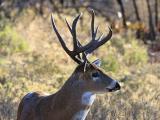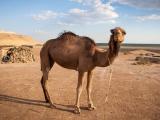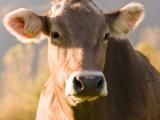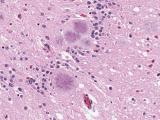Mar 19, 2004 (CIDRAP News) The US Department of Agriculture (USDA) confirmed today that it has licensed two different rapid screening tests for bovine spongiform encephalopathy (BSE) for use in USDA laboratories.
Bio-Rad Laboratories Inc., Hercules, Calif., announced yesterday that the USDA had licensed its test, called TeSeE, for use in the agency's expanding BSE testing program. Also yesterday, IDEXX Laboratories Inc., Westbrook, Me., said it had received USDA approval to sell its HerdChek BSE Antigen Test Kit to USDA-approved laboratories.
The USDA announced Mar 15 that it would greatly increase BSE testing over the next 12 to 18 months to find out if there are more cases in the nation's cattle herds. The agency has been under pressure to increase BSE testing since the first US case of BSE surfaced in Washington state in December.
Jim Rogers, a USDA spokesman in Washington, DC, today confirmed that the agency has licensed the Bio-Rad and IDEXX tests. Rogers said he didn't know when the agency will start to use the tests or whether private labs will be allowed to use them.
Bio-Rad officials said the TeSeE test can produce a result in 4 hours and has been used more than 22 million times by laboratories in Europe and Japan. Rogers said immunohistochemical staining, considered the gold standard test, can take up to 2 weeks.
"Independent field studies have shown the Bio-Rad BSE test to have the highest level of sensitivity and specificity of any rapid screening test available," the company said in a news release. It said the test can detect very low levels of abnormal prion proteins, the BSE agent, and is "the easiest method to adapt to mass screening programs."
An IDEXX news release stated, "HerdChek simplifies testing procedures compared to existing products on the market by eliminating complex protein digestion steps in the sample preparation process. This saves technician time and effort and reduces the potential for error." IDEXX Vice President Quentin Tonelli said labs can chose either a manual version of the test that requires little additional equipment or an automated version for high-volume use.
IDEXX spokeswoman Bonnie Reid said the test yields results in between 4 and 5 hours and will cost about $10 to $20 per kit. The test is not being used in other countries now but is under review in the European Union, she told CIDRAP News.
The Bio-Rad and IDEXX tests are the first rapid BSE tests to be licensed for use in the United States. Shortly after the first US case of BSE turned up last December, the USDA promised to begin assessing rapid BSE tests for possible use in expanded BSE surveillance.
On Mar 15 the USDA vowed to test as many as possible of the estimated 446,000 US cattle considered to be at increased risk for BSE in a one-time program to determine the prevalence of the disease. The agency didn't set a specific numerical goal, but said the program would detect 1 case of BSE in 10 million cattle with a 99% confidence level if 268,000 cattle were tested.
Bio-Rad officials said their test would be used by the USDA National Veterinary Services Laboratory in Ames, Iowa, and by a network of other labs that will help with the BSE surveillance program.
Bio-Rad said it is the leading seller of tests to detect transmissible spongiform encephalopathies (TSEs). A Bio-Rad test for chronic wasting disease (CWD), a TSE found in deer and elk, is used by Colorado and other states. The news release quoted Barbara Powers, a veterinarian at Colorado State University, as saying Colorado has used the test on nearly 47,000 deer and elk in the past 18 months.
Sagar Goyal, BVSc, PhD, of the University of Minnesota Veterinary Diagnostic Laboratory in St. Paul, also vouched for Bio-Rad's CWD test, which is an ELISA (enzyme-linked immunosorbent assay). "This is a very good test, very sensitive and specific," Goyal told CIDRAP News.
Goyal, head of serology and virology at the lab, said the lab used the test on more than 10,000 deer in the past year and had no false-positive results. The lab charges $25 per animal to do the tests for the Minnesota Department of Natural Resources. Goyal said it takes about a day to test about 250 samples, with three or four people working on the task.
Rogers said the USDA is evaluating several other rapid BSE tests but has not approved any of them yet.
See also:
Bio-Rad Web site (click "News" tab to find link to Mar 18 news release)
http://www.bio-rad.com
Mar 18 IDEXX news release
http://www.idexx.com/AboutIdexx/PressRoom/Releases/20040318pr.cfm















